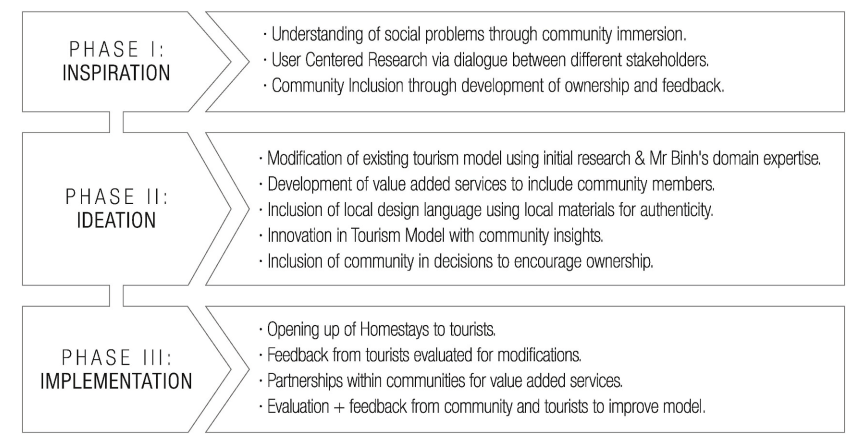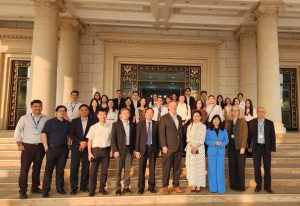Research Reveals How Design Thinking Can Lead to Success in Tourism Social Entrepreneurship
TSE (Tourism Social Entrepreneurship) has been highlighted as a factor in community social and environmental development (Florin & Schmidt, 2011). It aids disadvantaged stakeholders by ensuring financial stability while also enhancing tourism social/cultural and environmental benefits. However, not much has been written on how social entrepreneurs come up with these novel social solutions. In this context, a case study undertaken by Dr. Giang T. Phi of College of Business Management, VinUniversity and the research team at the University of Girona (Spain) has revealed that design thinking – a human-centered problem-solving technique – can be the secret to success for tourism social entrepreneurs.
The study examines the best practices of social innovation that one social entrepreneur adopted to support rapid growth in community-based tourism, and reports on the outcomes and lessons learned. The process of finding best practices included a) case study selection b) case study analysis and c) comparison with the proposed conceptual framework.
The authors chose to profile Mr. Binh Minh Duong, a tourism social entrepreneur in Vietnam, and his social enterprise Community-Based Tourism Travel (CBT Travel) because despite having no formal training, Mr. Binh instinctively applied the concepts of design thinking to social innovation, and in doing so, was able to build a successful and thriving social enterprise that can serve as a role model to others.
The case study is set in rural northwestern Vietnam, where half of the Vietnamese ethnic minorities live. For years, these minority communities have faced persistent socio-economic challenges ranging from poverty, hunger, frequent natural disasters that negatively affect their subsistent agricultural practices, to social isolation and low levels of education. In 2012, Mr. Binh was hired by the NGO Community Health and Development (COHED) to lead a community-based tourism (CBT) project that supported poverty alleviation and environmental protection for the local community in Mai Hich, Hoa Binh province. Mr. Binh identified a number of key issues with the traditional CBT development model as shown in Fig. 1.

Fig 1: Major problems identified by CBT Travel (Suchi Smita Mahato, Giang T. Phi and Lluis Prats (2021))
Source: in article.
It was remarkable that, without having any formal training or experience with design thinking, Mr. Binh tackled these problems using design thinking concepts that strongly resembled the three phases (i.e., inspiration, ideation, and implementation) in the IDEO human centered design handbook (IDEO, 2015) (Figure 2)

Fig. 2: CBT social innovation process to design thinking (Suchi Smita Mahato et al, 2021).
Source: in article.
The Inspiration Phase helped to provide a holistic understanding of community challenges through stakeholder dialogue. In the Ideation phase, Mr. Binh and his team included the community in discussions, to encourage ownership and gain insights for possible avenues for innovation. The implementation phase led to partnerships within the community for value added services, community feedback and development of future goals. As a result of this applied design thinking over the course of eight years of consultation, CBT Travel has implemented 80 CBT projects that provide social value through a value-based network. Before COVID-19 impacted tourism, CBT Travel set a goal of 500,000 tourist arrivals to CBT destinations for 2020. While that goal has not been met, there is hope that a new, equally ambitious goal can be met when travel restrictions are eased.
“By concentrating on the blind spot where social entrepreneurial intentions become successful actions, this article illuminates the black box of social innovation in tourism”, Dr. Giang Phi says.
By this finding, Dr. Giang Phi and the research team have provided an insight into how social entrepreneurs create innovative social solutions sustainably. The article also opens up further research opportunities for successful TSE intervention.
You can read the whole story at this LINK.
By Nguyen Minh Phuong
____________________________
References:
- Florin, J., & Schmidt, E. (2011). Creating shared value in the hybrid venture arena: A business model innovation perspective. Journal of Social Entrepreneurship, 2(2), 165–197.
- IDEO (2015). The field guide to human-centered design, 1st ed., p.11.



![[Job Opening]: Teaching Assistant for Research Minicourse Development at VinUniversity](https://vinuni.edu.vn/research/wp-content/uploads/2024/07/hiring-7062502_1280-300x143.jpg)